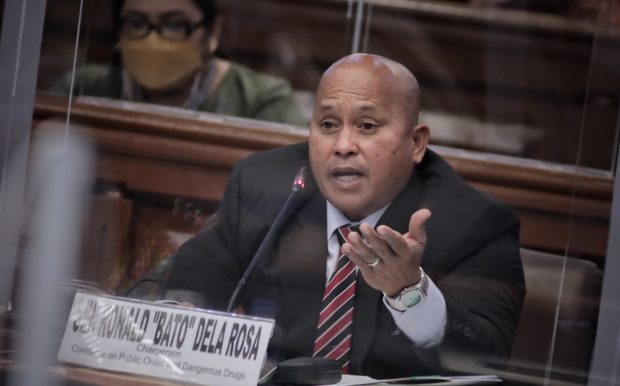
Sen. Ronald “Bato” Dela Rosa Senate PRIB file photo / Joseph Vidal
MANILA, Philippines — Instead of putting too much funds and energy into rice research, Senator Ronald dela Rosa has urged the Department of Agriculture (DA) to focus on root crops, saying these are healthier options that are also more resilient to typhoons.
Dela Rosa made his suggestion during Tuesday’s Senate finance subcommittee hearing when most of the discussion over the DA’s projected 2023 budget centered on rice research and the department’s efforts to aid farmers.
The senator claims that medical professionals have advised him to avoid rice since it increases his risk of developing diabetes, while crops are far better for one’s health.
“I think we are focusing too much on our rice program, for our rice development, we are fixated on rice when in fact — while it is true that we all consume rice — our expenses for research and development is that big, but we still cannot compete with Vietnam because they have the Mekong River that makes irrigation easier,” dela Rosa said in Filipino.
“When we were young, when we were running out of rice already, what my mother did was to put camote on our rice so it would not run out quickly […] But now that I am old, health and fitness experts have told me to stop eating too much rice because it is a cause of diabetes,” he added.
The senator, a former police chief who hailed from Mindanao, said that even if they were not wealthy when he was young, they were not afraid about running out of food because they had planted root crops within their backyard.
Because camote, cassava, gabi, and other root crops are grown beneath the earth, he said they will continue to thrive even after typhoons damage agricultural regions like those used for rice plantation.
“I realized now that we concentrate too much on rice, but we know that the weather now is very unpredictable, especially because of climate change. We always have cyclones, and rice is very vulnerable to typhoons. If you face a cyclone once, the palay would already fold,” he said.
“Whereas these mga root crops, even during cyclones at the mountaintops, or even at the hillsides, it is not immediately affected. […] Why not concentrate on producing root crops then plus education, we educate the public and tell them that these root crops are a better source of food, and this is healthier compared to rice,” he added.
In response, DA Senior Undersecretary Domingo Panganiban said that the department already has a crop diversification program, where other plants would be planted in place of palay. He also said that they are trying to establish an urban agriculture program to ensure that people living in highly-urbanized areas can also have their own food supply.
“We already have our program called crop diversification, after planting palay farmers can plant camote, or pechay and other kinds of plants that can be grown in just two to three months. After that we can plant palay again,” Panganiban said in Filipino.
“‘That’s the program that we have initiated now, and also we, since the start of the Marcos administration, we started urban agriculture. We have many sites here in Metro Manila, Central Luzon, Northern Luzon, over Visayas and Mindanao,” he added.
In 2013, after the onslaught of Typhoon Pablo, a farmers’ group in Mindanao said that planting camote was key to the survival not only of farmers affected by the cyclone but also for people who could have suffered from hunger.
READ: Lowly ‘camote’ finds value as survivor’s crop
Camote, despite its inferior image, is a low-cost but nutrient-dense crop product. The word is even used to mean stupid and wayward motorists.
READ: Root crops remove body toxins
Both Dela Rosa and Senate Minority Floor Leader Koko Pimentel believe the DA can start with camote, since it could be planted nationwide, unlike other crops, which would only be fit for plantation in select areas.
Earlier in the DA’s budget briefing, subcommittee chair and Senator Cynthia Villar questioned why the department is so fixated on giving farmers hybrid rice seeds when the costs for farming with hybrid variants are so high.
A huge portion of the discussions focused on rice research and other livestock concerns that the DA plays a role. Villar said earlier that the Senate subcommittee would hear the DA budget for two days because of the many aspects of the department’s budget that would need to be discussed.
READ: Villar to DA: Why prefer imported hybrid rice seeds? Not all farmers can use it